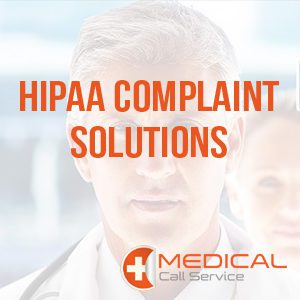
HIPAA-Compliant Communication: Safeguarding Patient Privacy with Medical Call Services
In today’s rapidly evolving healthcare industry, safeguarding patient privacy and ensuring compliance with the Health Insurance Portability and Accountability Act (HIPAA) has become more crucial than ever. Medical call services play a vital role in helping healthcare providers maintain HIPAA-compliant communication while offering efficient and high-quality patient care. In this blog, we will explore the importance of HIPAA-compliant communication, the role of medical call services in maintaining compliance, and key factors to consider when selecting a HIPAA-compliant medical call service.
The Importance of HIPAA-Compliant Communication
HIPAA, enacted in 1996, is designed to protect patient’s privacy and the security of their health information. Non-compliance with HIPAA regulations can result in severe financial penalties, damage to a practice’s reputation, and even criminal charges. Healthcare providers must ensure that all forms of communication, including phone calls, messages, and emails, adhere to the stringent privacy and security requirements set forth by HIPAA.
HIPAA-compliant communication is crucial for:
- Protecting patients’ sensitive health information
- Maintaining trust between patients and healthcare providers
- Avoiding potential legal and financial consequences
- Ensuring the security of electronic health records (EHR) and other digital data

The Role of Medical Call Services in HIPAA Compliance
Medical call services can play a significant role in helping healthcare practices maintain HIPAA compliance. These services typically provide professional, highly-trained operators who handle incoming calls, appointment scheduling, prescription refill requests, and other patient-related tasks. By working with a HIPAA-compliant medical call service, healthcare providers can ensure that patient information is handled securely and confidentially.
Key benefits of using a HIPAA-compliant medical call service include:
- Enhanced patient privacy: Medical call services that adhere to HIPAA guidelines implement strict protocols to ensure that patient information is kept confidential at all times.
- Secure data transmission: HIPAA-compliant call services use secure, encrypted channels for transmitting sensitive patient data, reducing the risk of unauthorized access or data breaches.
- Proper staff training: Medical call service operators receive comprehensive training on HIPAA regulations and best practices for maintaining patient privacy.
- Risk mitigation: By working with a HIPAA-compliant call service, healthcare providers can reduce the risk of non-compliance and avoid the potential legal and financial consequences associated with HIPAA violations.
Selecting a HIPAA-Compliant Medical Call Service
When choosing a medical call service, it’s essential to ensure that the service meets all HIPAA compliance requirements. Here are some critical factors to consider:
- HIPAA compliance certification: Look for a call service that is certified HIPAA-compliant and undergoes regular audits to maintain compliance.
- Encryption and secure data transmission: Ensure that the call service uses secure, encrypted channels for transmitting sensitive patient information.
- Comprehensive staff training: Inquire about the training and qualifications of the call service operators, particularly their knowledge of HIPAA regulations and patient privacy best practices.
- Business associate agreement (BAA): A BAA is a legally binding document that outlines the responsibilities of both parties in maintaining HIPAA compliance. Make sure that the call service is willing to sign a BAA to ensure their commitment to protecting patient information.

HIPAA-compliant communication is critical for healthcare providers to protect patient privacy and maintain trust. Medical call services can play a pivotal role in achieving compliance by securely handling patient calls and managing sensitive information. When selecting a medical call service, carefully evaluate their compliance certifications, data security measures, staff training, and willingness to sign a BAA. By partnering with a reliable, HIPAA-compliant medical call service, healthcare providers can enhance their practice’s efficiency, improve patient satisfaction, and safeguard patient privacy.
The Cost of Hiring a HIPAA-Compliant Medical Call Service
When considering a HIPAA-compliant medical call service, it’s essential to factor in the associated costs. Although these services can be an investment, they often provide significant value in terms of efficiency, patient satisfaction, and compliance with regulations.
Average Cost Examples
The cost of hiring a HIPAA-compliant medical call service can vary based on factors such as the size of your practice, call volume, and the specific services you require. Below are some general cost examples to help you gauge the potential investment:
- Per-call pricing: Some medical call services charge on a per-call basis, with costs ranging from $1 to $3 per call. This model may be more suitable for practices with lower call volumes or those looking for a more predictable billing structure.
- Per-minute pricing: Other call services charge by minute, which can range from $0.75 to $1.50 per minute, depending on the complexity of the calls and the level of service provided. This pricing model might work better for practices with fluctuating call volumes or those requiring more in-depth call handling.
- Monthly packages: Some medical call services offer monthly packages that include a set number of calls or minutes for a fixed price. The monthly cost of medical call services can start as low as $100 per month for a basic plan, with more comprehensive plans ranging from $500 to $1,000+ per month.
It’s important to note that additional costs may apply for services such as appointment scheduling, after-hours support, or specialized call handling. Always discuss your specific needs with the call service provider to receive an accurate quote.

Weighing the Investment
When evaluating the cost of a HIPAA-compliant medical call service, it’s essential to consider the value it provides to your practice. By streamlining communication, improving patient satisfaction, and ensuring HIPAA compliance, a medical call service can ultimately save your practice time, reduce the risk of costly fines, and enhance your overall reputation. It’s crucial to compare the costs of various medical call service providers and carefully assess the features, quality of service, and HIPAA compliance measures they offer. By doing so, you can make an informed decision and choose the right call service that best meets your practice’s needs and budget.
HIPAA-compliant medical call services offer significant benefits for healthcare practices, including enhanced patient privacy, streamlined communication, and reduced risk of non-compliance. When selecting a service, carefully evaluate its compliance certifications, data security measures, staff training, and cost structure. By investing in a reliable, HIPAA-compliant call service, healthcare providers can boost their practice’s efficiency, improve patient satisfaction, and safeguard sensitive patient information.

Leave a Reply